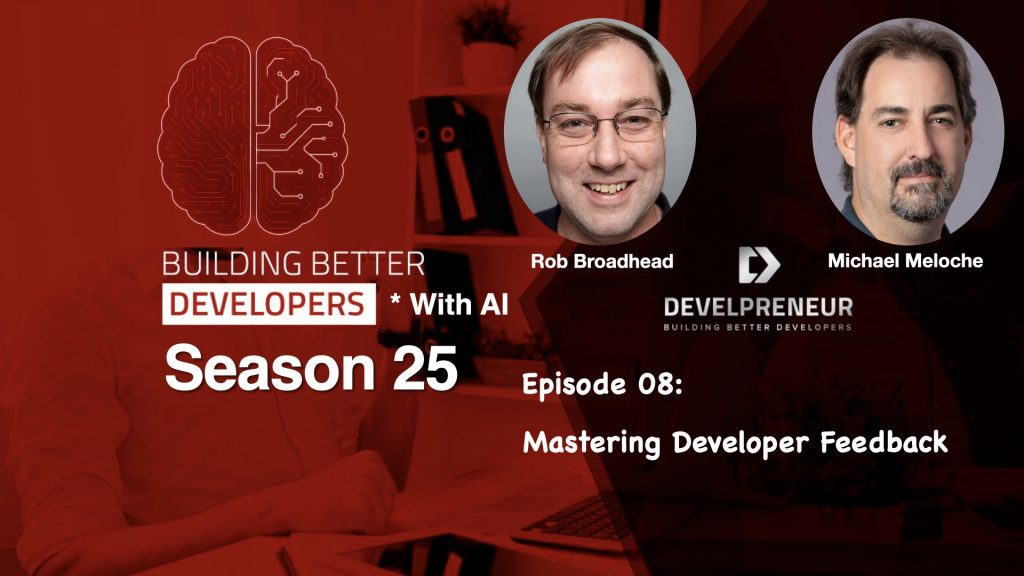In this episode of Building Better Developers with AI, Rob Broadhead and Michael Meloche take a deep dive into one of the most uncomfortable—but—essential parts of being a developer: developer feedback. Using AI tools like ChatGPT, they revisit their past topics and uncover new insights on how feedback, communication, and mindset shape stronger, more collaborative developers.
AI’s Perspective: Developer Feedback as a Growth Tool
Rob kicks off the episode by sharing how they asked ChatGPT to structure a show around developer feedback. The AI delivered a simple but powerful reminder: Feedback isn’t criticism. It’s a tool for growth.
Key Takeaway:
“Professionals seek feedback. Amateurs avoid it.”
By reframing feedback as data rather than a personal critique, developers can use it to refine their skills, just as they would when debugging their code.
Rob emphasizes that real-time, in-person code reviews often reveal more than written comments. They provide opportunities for knowledge sharing, cross-training, and discovering undocumented project details.
Creating a Safe Space for Developer Feedback
Michael reminds listeners that developer feedback works best in a safe and collaborative environment. Taking a breath before reacting allows you to absorb feedback objectively.
Pro Tip:
Treat feedback as input to improve — not a personal attack.
However, Michael cautions against over-relying on constant feedback. While it’s essential for growth, too much can erode confidence. Effective developers seek feedback purposefully and filter out noise.
Code Reviews: The Most Overlooked Feedback Tool
Both hosts stress the value of regular code reviews as an essential form of developer feedback:
- They catch errors early
- Enforce coding standards
- Reduce duplication and dead code
- Provide cross-training for the team
Michael’s Advice:
“If your code changes are too big to review efficiently, your process needs adjusting.”
Regular, focused code reviews keep teams aligned, enhance code quality, and enable developers to learn from one another.
Beyond Code: Communicating with Non-Developers
Rob reminds us that actual growth comes not just from technical feedback but from communicating effectively with non-developers. Whether it’s labeling input fields clearly or translating technical issues for business stakeholders, every interaction shapes project success.
Developer Feedback in Action:
Understanding your users’ language makes your product better — and prevents avoidable frustration.
How to Process Developer Feedback Without Ego
The hardest part of handling developer feedback? Managing your emotions. Rob and Michael outline how to stay grounded:
- Don’t react — review, digest, reflect
- Ask clarifying questions without defensiveness
- Look for patterns across multiple feedback sources
By approaching feedback with curiosity rather than ego, developers grow faster and foster stronger teams.
Final Thoughts: Winning Through Listening
Rob closes with timeless advice:
“The person who talks the least in a meeting often wins.”
Listening more — to peers, customers, and users — leads to better feedback, fewer misunderstandings, and stronger products.
Developer Feedback may be uncomfortable, but it remains one of the fastest, most effective ways to grow as a developer. Combined with AI tools, code reviews, and intentional communication, feedback turns everyday frustrations into long-term success.
Stay Connected: Join the Developreneur Community
We invite you to join our community and share your coding journey with us. Whether you’re a seasoned developer or just starting, there’s always room to learn and grow together. Contact us at [email protected] with your questions, feedback, or suggestions for future episodes. Together, let’s continue exploring the exciting world of software development.

